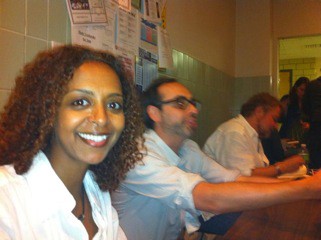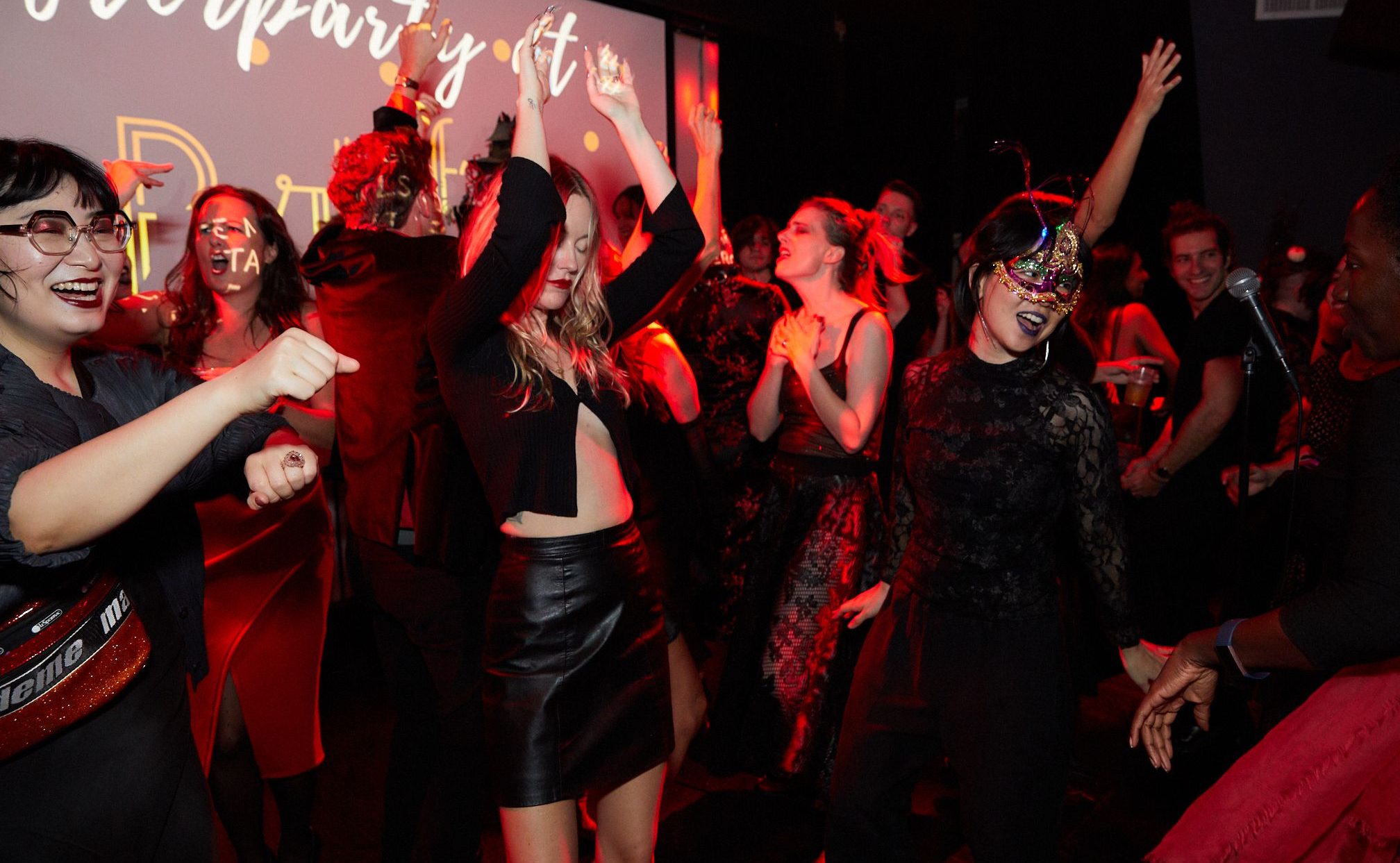news
ALL THINGS BROOKLYN BOOKFEST

BORDER CROSSING

Maaza Mengiste (left) + Shteyngart & Urrea blurs (right)
On account of the rain that washed over the second half of the Brooklyn Book Festival, the International Stage was relocated to a lecture hall inside St. Francis College. The fluorescent lighting overhead made the new Border Crossing venue seem more classroom than literary lounge. “Welcome to Econ 101,” said moderator Robert Spillman (Tin House) to open the evening’s seminar.
The writers themselves served as lessons in geography and history: Luís Alberto Urrea (Into the Beautiful North) was born in Tijuana, Maaza Mengiste (Beneath the Lion’s Gaze) hails from Ethiopia, and Gary Shteyngart (Super Sad True Love Story) is a product of “St. Leninsburg.”
In spite of their dissimilar backgrounds, as “international writers” the trio had much in common. They all found that a new location was beneficial to their understanding of the places they portray in their work.
Mengiste used distance as a tool, one that offers new perspective and authority. Urrea said that while writing Hummingbird’s Daughter, “some of the most specific things about Mexico came to me in France.” Shteyngart added that he preferred to write in locations where he didn’t speak the language.
“I wrote most of [Super Sad True Love Story] in Italy — where they speak Spanish, I think.”
The writers all agreed they had trouble being labeled by their backgrounds. “Mexicans call me a gringo, while Americans call me a Mexican writer,” Urrea said.
Shteygart claimed the Russian reviews of his novel read “Balding traitors betrays motherland.” But he did see some benefit. “Being an immigrant writer is lucrative,” Shteyngart said, adding that his publisher has a literary bat signal that illuminates the skyline whenever an international panel needs an oppressed writer.
Shteyngart also reflected on the premonitions of his satire (much of Super Sad True Love Story had to be rewritten because what seemed absurd when he was writing in 2006 came true in 2008). “That’s the trouble of being a smart ass: reality moves much too fast,” said Shteyngart. “After this I’m just going to be a blogger.”
Covered by Benjamin Samuel.
PRIMAL IMPULSES AND PROSE
1. MG. 2.Writer Charles and emerging adult Abigail, waiting in line for The World in Fiction panel, with Jabari Asim, Russell Banks, and Mona Simpson.


People were lining up around the block, in the (almost) rain, preceding the Primal Impulses and Prose panel. “This is a booky clusterfuck!” I texted my editor. And it was.
Each of the three panelists (Mary Gaitskill, Ben Greenman, & Simon Van Booy) read a selection showcasing some kind of Primal Impulse. This led to an emotionally intense reading, so it was nice when Ben Greenman deviated from said topic for a moment to read his short “Blurbs”, which, as the piece states for itself, was kind of like if the blurbs from “The Bridges of Madison County and the blurbs from Infinite Jest” met and had a baby. Gaitskill managed to take a few breaks from looking intense and severe, and even smiled a couple times and cracked a few jokes. I appreciated her deflection of moderator Harold Augenbraum’s question, who asked something about her intent when repeating the word “soul” so often in her story “Mirror Ball.” She said it wasn’t artistic — it was unavoidable. It was what the story was about, like how they use the word “ring” a lot in The Lord of the Rings.
POETRY AND PROSE
Monica Ferrell, Phillip Lopate, Katha Pollitt, and Maureen N. McLane took on the topic of “Poetry and Prose” and how the two forms informed and differed from each other. “One thing sends me to the other,” stated Pollitt. “…and they don’t always help each other. Sometimes poetry helps out the prose, but not the other way around.” Lopate said that poetry starts, for him, as a “churning in (his) gut”, and Ferrell agreed, saying that both her poetry and fiction writing required some sort of other-wordly inspiration, but poetry was more of a rhythm thing, while fiction had to do with a line of dialogue, or the ways that two characters interact. This was a group, as moderator Meghan O’Rourke described, that was “polymorphously perverse.”
THE WORLD IN FICTION
By 4 p.m. the crowd was soaked, many of them having just stood in the rain to hear Sarah Silverman and David Rakoff in front of the courthouse. Inside the building, Jabari Asim, Russell Banks, and Mona Simpson prepared to discuss The World in Fiction. The three panelists agreed that they preferred to write about characters that were on the fringe of major sociological events, or perhaps in the middle of them. As Banks said, one of fiction’s greatest strengths is that it is able to make dignified the inner lives of human beings, in a way that other art forms cannot. Because of this, he is able to get inside such difficult characters as the one in his upcoming novel, The Lost Memory of Skin, which is about a convicted sex offender living under the causeway in Miami. The authors also discussed why they preferred to write fictional narratives about events that happened to them in their own lives. Simpson said she preferred fiction because “life is too messy” and fiction gives it some structure.
Covered by Julia Jackson.
ONE STORY, ONE BOROUGH
1. One Story, One Borough-ers. 2. Not “acoustically wet,” just rainy.


Earlier this week, in the lead up to the Brooklyn Book Festival, One Story magazine dispatched volunteers to Brooklyn subway stations to hand out back issues featuring three Brooklyn-based writers. This Sunday those writers were on hand at BookFest to read from their work. However, because of rain that had already fallen and more rain that was yet to fall, the “One Story, One Borough” event was moved from an outdoor stage into the atrium of the Brooklyn Borough Hall.
All three readers tackled the new surroundings head on. James Hannaham (God Says No), up first and reading from his story “Interrupted Serenade,” noted that the atrium was the most “acoustically wet” space he’d ever read in and, though claiming not to be a singer, offered a few bars of “Amazing Grace” to take advantage of the vibrato.
Reif Larsen (The Selected Works of T.S. Spivet), reading from his story “The Puppet,” used the institutional echo to set the scene for his reading, inviting the audience to imagine the bombed-out library in 1995 Sarajevo that figures in the end of his story. Mr. Larsen then unflinchingly read from a separate, library-less scene much earlier in “The Puppet.”
Nonetheless, the scene-setting approach was stirring enough that Caedra Scott-Flaherty, the final reader, invoked it herself, ironically asking the crowd to imagine the echoing atrium as a car driving south through Mexico. Silently, and without fuss, the crowd rose to the challenge.
After the readings, when alerted to the Brooklyn-based motif of the event, Mr. Hannaham admitted that he thought the readers being locals was a matter of convenience, not theme. He lives only a short walk from the Borough Hall plaza where the festival was held. But the rain made nothing convenient on Sunday. Mr. Hannaham took the train to his relocated reading.
Covered by Judson Merrill.
FINDING THE FUNNY
1. Hodgman, bringing chair to justice. 2. All panelists, preparing with care.


Predictably, the writers on the Brooklyn Book Festival’s panel Finding the Funny: The Humor of the Everyday immediately turned the hallowed Borough Hall Courtroom into a circus. Humorists John Hodgman (The Areas of My Expertise), Sloane Crosley (How Did You Get This Number), and Kristen Schaal and Rich Blomquist (The Sexy Book of Sexy Sex) immediately took the initiative to move from the tables on the floor to preside over their audience from judge’s table above.
Microphones were rewired, chairs passed around, and seating rearranged while Hodgman appealed to the audience. “Does anyone here have a copy of my book?” It wasn’t a poll, he’d forgotten to bring a copy with him.
When all was settled and sufficiently feng shui, moderator Dan Fierman (GQ) called court into session by comparing comedy to pornography. “What does it for you, doesn’t necessarily do it for me.”
After reading from a borrowed copy of his compendium Areas of my Expertise, Hodgman threw the paperback into the audience — he drew the line of at the hardcover, though, that’d be going to far.
“This book will save lives,” said Schaal, who read an ode inspired by the Vagina Monologues. Never before has a taint been saluted in a courtroom without the speaker being held in contempt.
Asked by the audience whether he was concerned about exposing his best material on Twitter, Hodgman (who has close to 450,000 followers) said there was nothing to be gained by holding back material, adding “if you’re holding back, you’re ashamed of it.”
That’s what she said.
Covered by Benjamin Samuel.









